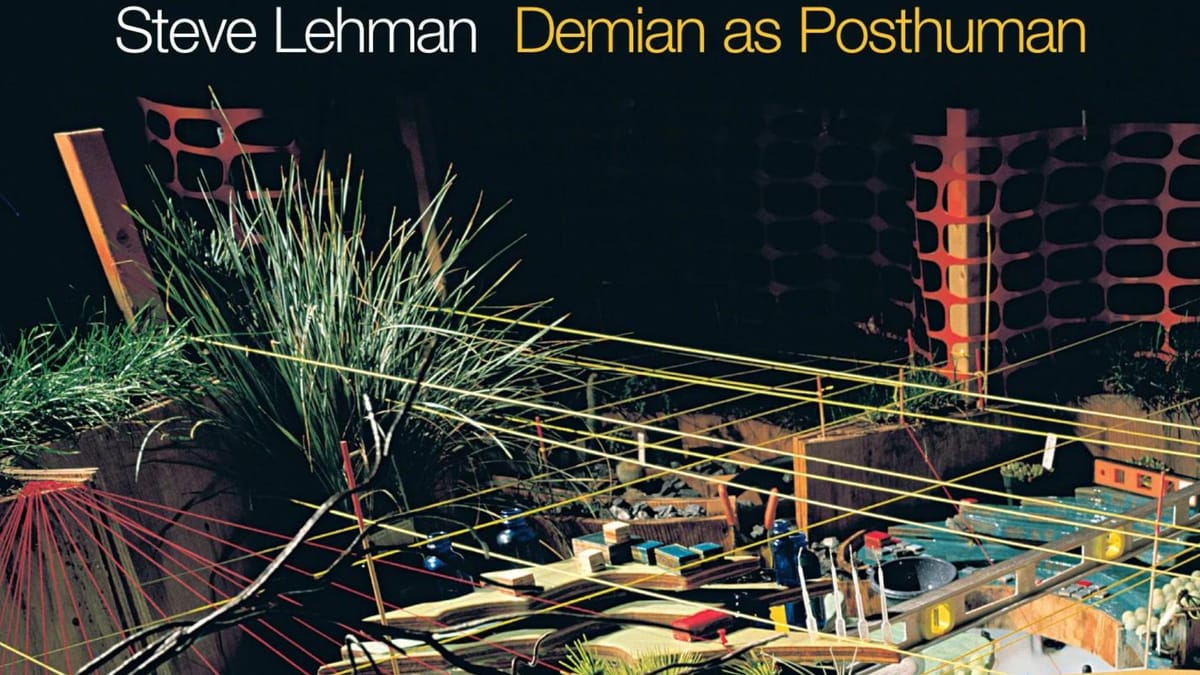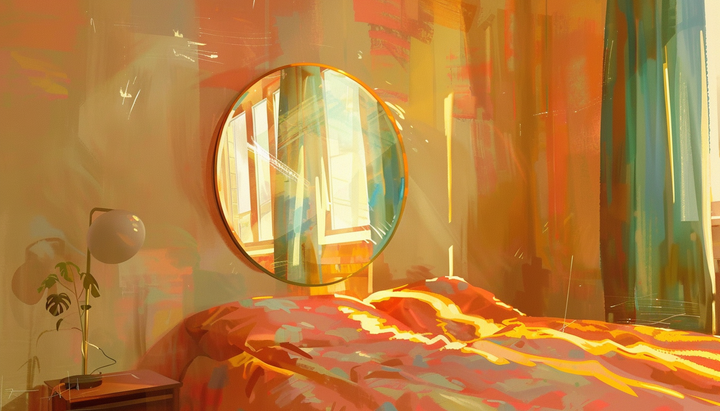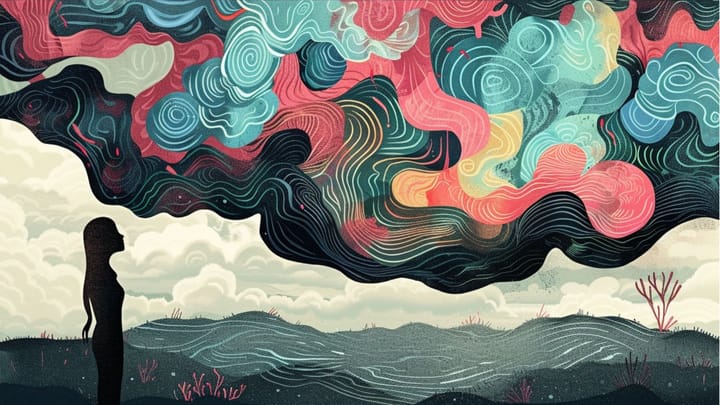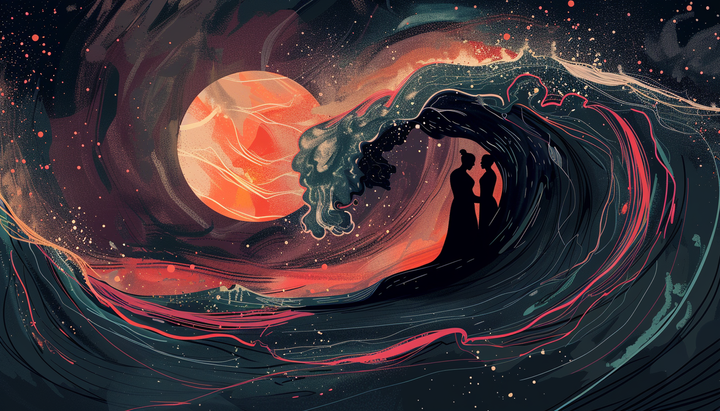Demian, Jazz, and the Path to Oneself

This essay was originally published by Ravi Joseph on Substack.
Sometime around 2007 I discovered the work of alto saxophonist Steve Lehman. He was, and continues to be, a frequent collaborator of cutting-edge downtown jazz musicians like Vijay Iyer and Tyshawn Sorey. I was an aspiring jazz musician at the time and I wanted to play and write music like those musicians. Their compositions had an intellectual heft, employing complex melodies and dizzying rhythmic figures, but they also engaged with a distinct emotional and aesthetic sensibility, evoking intensity, longing, claustrophobia, and most of all a feeling of being on the cutting edge. They felt like acutely penetrating dispatches about the modern condition, something even more modern than the current year. Their actual improvising on their instruments was indebted to a form of the jazz tradition, but often via lesser-known figures like Anthony Braxton and Andrew Hill rather than the more mainstream work of Miles Davis and Herbie Hancock. Their improvised lines were jagged and dissonant, but were propelled by a head nodding rhythmic acuity that compelled you even if you couldn't tap your fingers along in 4/4 time. I didn't just want to play like those musicians, I wanted to be like those musicians; they seemed to stand for an utter resoluteness and singularity against the banality of cultural options I saw in front of me.
In 2005, Lehman released the album Demian as Posthuman, which I downloaded sometime later. It was not an acoustic album with rhythms derivative of straight-ahead jazz, but rather featured grooves drawn from dance music and synthesized electronic soundscapes. What was constant between this and his more straight-ahead work was the cutting alto saxophone improvisations, now featured over menacing electronica.
I came to know that Demian referred to in the title was a 1919 novel written by Herman Hesse in which the titular character Max Demian serves as a sort of spiritual guide for the protagonist. Though I now see posthumanism on a continuum from the technological transhuman possibilities advocated by technologists like Elon Musk to the biological-spiritual evolution predicted by Sri Aurobindo, I didn't have a clear vision of the varieties of posthumanism at that point. But I did have a sense that there would be something coming after the human; I felt that posthumanity was not an abstraction but a coming reality. I took the allusive title Demian as Posthuman to mean that the posthuman serves as a guide to our current humanity, teaching it and drawing us on. So with Lehman's compositions: the electronic beats of the album and even Lehman's synthetic sounding saxophone serve as a figure for posthumanity, which leads the humanity embodied by Lehman's commitment to the jazz tradition.
Already in this matrix of associations we can see the importance of the path, the idea of a personal spiritual path through life. This concept has been an important figure for mystical contemplation in my life as of late, but I now see it patterning even my earlier explorations. The idea of a spiritual path is drawn from an analogy to a path leading from one place to another, such as a path leading through a forest or a path traced out between two towns. A path shows you the specific way for you to walk through the forest. The path is contrasted to the incoherent state of pathlessness; walking through the forest with no path, you wouldn't know which direction to take, or which sequence of steps might be directionally correct but may still lead to an impassable barrier or difficulty like a boulder or stream. For a path, the condition is that there must be a source, a destination, and a field of experience like a forest, and the specific pathway is that which can be traced through the forest from the source to the destination.
For the spiritual path, the goal is spiritual realization. The spiritual path differs from a forest path in that a forest path is the same for everyone, but the spiritual path is different for each person. A person's spiritual path is the specific pathway through life that cuts through all the possible experiences of life to take them to their spiritual destination.
In my life as an aspiring jazz musician, jazz was my path. By practicing jazz improvisation and composition and emulating my favorite jazz musicians, I advanced further towards my spiritual goal of becoming like my favorite jazz musicians, embodying the same sensibilities and values that they embodied. They themselves traveled down a path. Not the path of popular music and learning to compose ear-catching hooks like Taylor Swift, nor even the mainstream path of jazz based on blues and Tin Pan Alley standards, but rather the path of the jazz innovators, the unheralded masters like Braxton and Henry Threadgill who came before them, resolutely charting idiosyncratic, challenging compositions that expressed difficult but necessary emotions. The path for them, though, was the same as any path of growth for an artist: learning musical devices, gaining mastery over them, and using them to express their inner lives.
I came across Hesse's Demian in the Strand bookstore in NYC in the summer of 2008. While I wasn't a novel reader at that time, I picked it up because I knew the reference from Lehman's album and was curious. I thought at the time that it was another step along my path as a jazz musician. I didn't realize it would be the commencement of a jagged turn into my path through the properly spiritual life.
The book itself is the tale of the spiritual life and path of its protagonist Emil Sinclair. (Hesse originally published the book under that pseudonym, and only later editions were published under his real name.) At the beginning of the book, we find Sinclair as a child confronted with the duality between two worlds, the world of purity, goodness, and bourgeois order represented by his well-to-do family, and the other world of "serving girls and traveling tradesmen... ghost stories and scandalous rumors, a richly colored flood of monstrous, tempting, frightening, mysterious things like the slaughterhouse and the prison, alcoholics and bickering women, cows giving birth and horses with broken legs, and stories of burglaries, murders, suicides." Sinclair is drawn to the order and safety of this world of light, but Sinclair is not able to ignore the dark world, feeling that "wherever I turned my eye or ear the other world was always there... At times I even liked the forbidden world best..."
But he is initiated into the forbidden world and cast out of the world of light when a bully named Franz Kromer comes to school. He finds himself lying about stealing a load of apples, and the bully uses this lie to blackmail him into more thefts to satisfy his own appetite. Sinclair is only saved by the titular Max Demian, a precociously mature boy who takes a liking to Sinclair. "He moved like a man among us children, a man from a different world—actually, like a lord." Demian confronts Kromer, saving Sinclair from torment.
During the rest of the time at school, Demian and Sinclair are distant, but get into occasional deeply philosophical conversations. Demian gives Nietzschean interpretations of the parable of Cain and Abel and the thieves at Golgotha. When I first read the book, the novelty of all these philosophies struck me. By that time I had been an atheist for many years and wasn't shocked by the anti-Christian message. Rather, it was the coherence and heterodoxy of the ideas Demian espoused that fascinated. Could he really think "This man [Cain] had power, and others were afraid of that power... Anyone with courage and character always seem unnerving to others." Or later, "The greeks, on the other hand, and many other peoples too, considered this [sexual] urge a God, and they honored it in great festivals. In other words, 'forbidden' is not an eternal truth—it can change." From the familiar-seeming ground of myth, something we learn about in didactic ways in grade school, grew real possibilities for the values of life like power and courage, and growing beyond life into godliness.
Of course, it's easy to recognize this philosophy now as a mystical Nietzscheanism. As a spiritual seeker for years now, I know the difficulty is not in having these lofty thoughts but the boring and sometimes painful process of implementing them in one's life. But at the time, this mystical Nietzscheanism was thrilling. If the mystical Nietzscheanism was new and exciting, the book connected with my existing knowledge through the intermediary of German Romanticism. When I was pursuing the path of music, I had absorbed the ideology of romanticism somehow. There wasn't a specific book I had read, but the ideas permeated my mind—most likely from reading dozens of interviews with musicians and seeing that they thought about music and art this way.
In this line of thinking, art is a sacred thing, a product of genius, a way in which one's inner being was expressed, and the viewer or listener would be brought closer to religious experience through art than any other method available to a secular age. The aspect of German thought that I couldn't quite grasp at the time came in a character in the book, the musician Pistorius. He is a musician and scholar of religious philosophies and schools who is also a devotee of the god Abraxas who bridges light and darkness who serves as a mentor to Sinclair. I didn't at the time understand the trope of the religious scholar who aims to unify knowledge, an archetype played in our time by a figure like Jordan Peterson. I understood Pistorius instead as mostly as a musician similar to the musician-scholars I had known up to that point like Vijay Iyer and Steve Coleman. Through the link of Romanticism, I could see how the emotional states I had brought to pursuit of music, the longing, the beauty, and even the suffering, could be brought to the spiritual path; indeed, it appeared that the paths were one and the same.
I could also deeply relate to Hesse's depiction of the suffering of the spiritual path. After leaving his grade school for boarding school, Sinclair loses track of Demian and enters a difficult, lonely period of life. Outwardly social, he grows spiritually distant from his soul and from others. "I was living in a self-destructive riot of sensuality, and while my schoolmates saw me as a leader, a devil of a fellow and a damned sharp and clever guy, deep inside me hid a timid soul fluttering with fear." My time in high school and college, the first part of which I spent at music school, was not easy. I felt like there was a darkness that I was constantly battling, that was constantly on the edge of my experience. Even when I saw glimpses of higher experience, especially the world of music, darkness was close at hand. I remember long evenings spent along in the practice rooms in college, each note or melody I played a spiritual battle between the order and charm of the soul and a strange darkness which threatened to overwhelm me. This is the atmosphere Sinclair seems to breathe in the middle part of his journey. I could also relate when he finds the ideal of Beatrice, a beautiful girl who he falls in love with and inspires him to live for a higher ideal. I, too, had found in music and romantic love ideals which I thought could purify me from the darkness, and I set out to remake myself through higher ideals.
Though at the time I saw a sharp divergence between my jazz phase and my spiritual phase, I now see that they were continuous, that there was just one path of seeking throughout. In jazz, I sought the highest light that I could experience. When I saw an even higher light than that, I stopped seeing jazz as the only goal and moved on to the higher goal I saw, like someone leaving behind a lower trail at a fork when they see that another trail will lead to an even higher vista.
Sinclair loses touch with Demian for a long time during his struggles, but Demian always remains in view. At one point, devotionally intending to paint a picture of Beatrice, Demian finds himself painting a portrait of Demian instead. This shows how on the spiritual path, the image of what must come next is revealed from within, not by any outer structure. If I went by the outer structures in my life I would have continued with jazz, as I was committed to it and my life was bound up in it. But instead I found myself drawn to the libraries researching esoteric philosophies, like a latter day Pistorius, and departed into another vision for my life.
I returned to Demian recently because I've seen another possible fork in my path in the attempt to write a philosophical coming-of-age story. I thought I would return to this book which meant so much to me at the time and see if it could even serve as a model for this next phase. That turned out to be too much to ask of it. Demian offers little in the way of a model for a contemporary novelist. There is little interpersonal drama, or much of a "plot". Nor did I have much use for the actual doctrines which so excited me then.
Yet Demian was tremendously compelling even now as a depiction of the spiritual path. The exact form of Sinclair's struggle is not so compelling as the fact that he consistently seeks for something—and eventually finds it. Indeed, that is the dramatic question of the book, whether Sinclair will find "the path to himself." The exact content of the doctrines is not so compelling as the fact that the characters so passionately believe in them, argue about them, stake their lives on them.
I have been frustrated in recent years by the fact that the exact nature of my path remains so opaque to me. I work with a variety of spiritual practices, but I haven't found one that takes me like a smooth car ride into the upper realms. I am engaged with various activities in the world but haven't seemed to find the one where the inner engagement seems to match outer reception within the world; all is still a struggle.
I often look back at my time pursuing jazz as a paradigmatic case of what it looks like to follow a path—at least then I knew where I wanted to go and had a rough idea of how I could get there. Yet when I really look back at the time when I was pursuing jazz, things weren't so clear to me either. I was unclear who my main model as a musician would be, whether it would be the avant-gardists or the straight ahead people or whether I should find some new way of playing altogether. It wasn't clear how I would make money and find outer success. Composing was inconsistent and a struggle. I found the practice of transcribing jazz solos which allowed a rapid advance at one point but I exhausted that avenue later and didn't see what would be musically compelling. It was still a path through perilous terrain.
Towards the end of the book, Max Demian's mother, who turns out to be the final attractor point running through the entire story, asks Demian, "Was it only hard? Wasn't it lovely too? Do you wish you had had a prettier, easier way?" I have not yet reached the point where I can sit with Demian's mother Frau Eva and know that I've reached the thing that I'm seeking for; from such a point it may be possible to look back on one's path and know that it was all entirely for the best. But I do see that gradually things have been revealed, the necessary steps have become clear, and that help comes when you least expect it. A path is not just a walk on a straight line through safe and level ground; it is a way traced through terrain which is itself difficult to hazard. The entirety of the path cannot be seen in advance and one has to trust that by putting one foot in front of the other, the final destination will indeed be reached.



